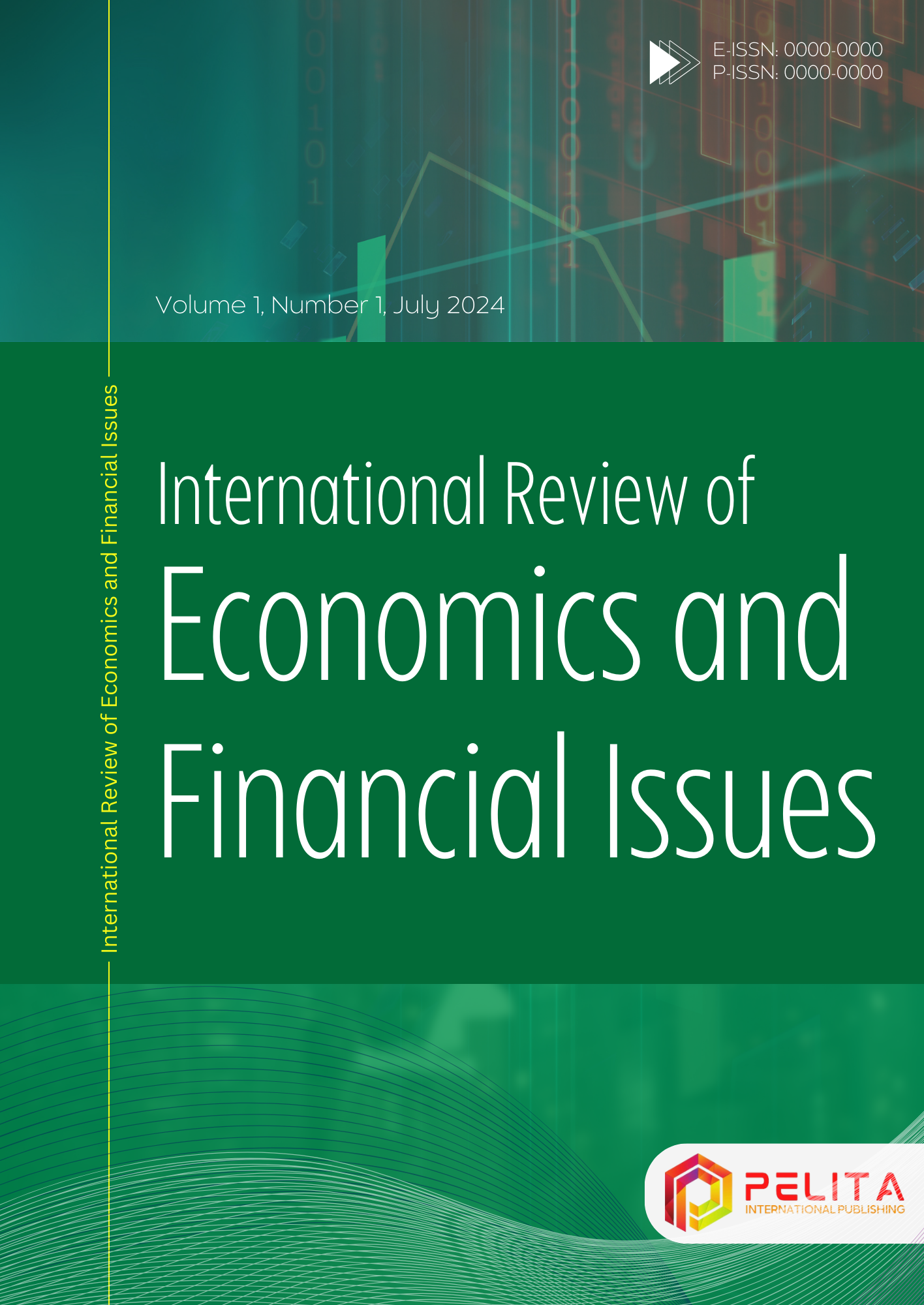
Cash dividend: Debt policy and liquidity in Indonesian consumer cyclicals company
DOI:
10.62941/irefi.v1i1.10Downloads
Abstract
This study aims to investigate whether debt policy in Indonesia tends to commit cash dividend and whether liquidity maximizes cash dividend. Using a purposive sampling technique, 16 consumer cyclicals companies were selected as research samples that are wholly registered on the Indonesia Stock Exchange. A total of 142 firm-year observations were provided by their annual reports from 2018-2021 and processed within the multiple linear regression statistical method. The study depicts that debt policy negatively affects cash dividend. Meanwhile, the liquidity ratio cannot maximize or minimize cash dividend payments by companies.
Keywords:
cash dividend debt policy liquidityReferences
Abdullah, H. (2021). Profitability and Leverage as Determinants of Dividend Policy: Evidence of Turkish Financial Firms. Eurasian Journal of Management & Social Sciences, 2(3). https://doi.org/10.23918/ejmss.v2i3p15 DOI: https://doi.org/10.23918/ejmss.V2i3p15
Abrar, B., Trisakti -Jakarta, U., & Arisandi, D. (2017). IMAR Indonesian Management and Accounting Research Analysis the Impact of Profitability, Liquidity, Leverage and Company Size on Dividend Policy Riandra Ghazyla. http://www.trijurnal.lemlit.trisakti.ac.id/index.php/imar
Adiputra, I. G. (2021, August). The Influence of Profitability and Financial Leverage on Dividend Policy: An Evidence from Manufacturing Industrial Companies in Indonesia. In International Conference on Economics, Business, Social, and Humanities (ICEBSH 2021) (pp. 1346-1350). Atlantis Press. DOI: https://doi.org/10.2991/assehr.k.210805.211
Ariani, M., Wijayanto, R., Raharjo, T. P., Hasnawati, & Oktaviani. (2023). Factors affecting dividend policy in companies in the era of COVID-19 pandemic. Devotion - Journal of Research and Community Service. DOI: https://doi.org/10.36418/dev.v4i1.384
Arsyad, M., Haeruddin, S. H., Muslim, M., & Pelu, M. F. A. R. (2021). The effect of activity ratios, liquidity, and profitability on the dividend payout ratio. Indonesia Accounting Journal, 3(1), 36. https://doi.org/10.32400/iaj.30119 DOI: https://doi.org/10.32400/iaj.30119
Aswad, H. (2023). Institute of Research and Publication Indonesia IJBEM: Indonesian Journal of Business Economics and Management Cash Dividend Policy is Influenced by Profitability and Liquidity in Consumption Goods Industry Sector Companies Listed on the Indonesia Stock Exchange (IDX). Institute of Research and Publication Indonesia IJBEM: Indonesian Journal of Business Economics and Management, 2, 44–50. DOI: https://doi.org/10.57152/ijbem.v2i2.772
Azman, P. F., & Zuraida, Z. (2023). The Effect of Profitability, Capital Structure and Cash Dividend on Firm Value of Public Non-Financial Companies in Indonesia During the Period Before and During the Covid-19 Pandemic (2018-2021). International Journal of Current Science Research and Review, 06(08). https://doi.org/10.47191/ijcsrr/V6-i8-55 DOI: https://doi.org/10.47191/ijcsrr/V6-i8-55
Djazuli, A. (2020). The Effect of Liquidity, Solvency and Profitability on Dividend in the Manufacturing Listed Firms on the Indonesian Stock Exchange. In International Journal of Finance Research p-ISSN xxxx-xxxx (Vol. 1, Issue 1). DOI: https://doi.org/10.47747/ijfr.v1i1.19
Endang, M. W., Suhadak, S., Saifi, M., & Firdausi, N. (2020). The effect of ownership structure and leverage towards dividend policy and corporate values. JPAS (Journal of Public Administration Studies), 5(1), 1-4. https://doi.org/10.21776/ub.jpas.2020.005.01.1 DOI: https://doi.org/10.21776/ub.jpas.2020.005.01.1
Fatihani, F., Wana, D., Riyadi, S., Suparmun, H., Indrasari, A., & Endri, E. (2022). Determinants of dividend policy of manufacturing companies in Indonesia. In Academy of Accounting and Financial Studies Journal (Vol. 26, Issue 1).
Kompas. (2005, May 11). Meski Rugi Bersih, Apexindo Mampu Bagi Dividen. Www.Apexindo.Com.
Mulyati, S., & Yahya, S. (2022). The Effect Of Free Cash Flow, Debt Policy and Profitability on Dividend Policy (Studi Empiris Pada Perusahaan LQ 45 Yang Terdaftar Di Bursa Efek Indonesia Tahun 2019-2020). Accounting Research Journal of Sutaatmadja (ACCRUALS, 06(2), 96–107. https://doi.org/10.35310/accruals.v6i02.921
Nurchaqiqi, R., & Suryarini, T. (2018). Accounting Analysis Journal The Effect of Leverage and Liquidity on Cash Dividend Policy with Profitability as Moderator Moderating. Accounting Analysis Journal, 7(1), 10–16. https://doi.org/10.15294/aaj.v5i3.18631
Sakir, A., & Fadli, M. (2014). Influence Of Managerial Ownership, Debt Policy, Profitability, Firm Size, and Free Cash Flow On Dividend Policy A Study in Indonesian Manufacturing Industries. in Delhi Business Review (Vol. 15, Issue 1). DOI: https://doi.org/10.51768/dbr.v15i1.151201402
Saleh, T. (2019, May 29). Usai Bagi Dividen Rp 1,38 T, Saham PGAS Malah Melejit! CNBC Indonesia.
Sarumpaet, T. L., & Suhardi, A. R. (2019). Implications of Profitability, Liquidity, Leverage and MBV on Dividend Payout Ratio in Manufacturing Companies in IDX 2014-2016. In International Journal of Innovation, Creativity and Change. www.ijicc.net (Vol. 6, Issue 8). www.ijicc.net
Utami, E. S., & Gumanti, T. A. (2019). Analysis of cash dividend policy in Indonesia stock exchange. In Investment Management and Financial Innovations (Vol. 16, Issue 3, pp. 97–105). LLC CPC Business Perspectives. https://doi.org/10.21511/imfi.16(3).2019.10 DOI: https://doi.org/10.21511/imfi.16(3).2019.10
Wahyudin, A., & Salsabila, K. ’. (2019). Firm Size Moderates the Effect of Free Cash Flow, Firm Growth, and Profitability on Debt Policy. JDA Jurnal Dinamika Akuntansi, 11(1), 89–97. https://doi.org/10.15294/jda.v11i1.9766
Winarni. (2023, April). 8 Emiten Pembagi Dividen Tunai Tertinggi Sepanjang April 2023. Dataindonesia.id.
Zainuddin, Z., Andaresta Mananohas, O., & Akindutire, O. R. (2020). The Effect of Debt Policies, Profitability, Managerial Ownership Structure, and Liquidity on Dividend Policy. The Indonesian Journal of Accounting Research, 23(03). https://doi.org/10.33312/ijar.483 DOI: https://doi.org/10.33312/ijar.483
License
Copyright (c) 2024 Ella Rahmayanti, Saryati; Khairul Aswadi

This work is licensed under a Creative Commons Attribution 4.0 International License.
You are free to:
- Share — copy and redistribute the material in any medium or format for any purpose, even commercially.
- Adapt — remix, transform, and build upon the material for any purpose, even commercially.
The licensor cannot revoke these freedoms as long as you follow the license terms.
Under the following terms:
- Attribution — You must give appropriate credit, provide a link to the license, and indicate if changes were made. You may do so in any reasonable manner, but not in any way that suggests the licensor endorses you or your use.
- No additional restrictions — You may not apply legal terms or technological measures that legally restrict others from doing anything the license permits.
Notices:
You do not have to comply with the license for elements of the material in the public domain or where your use is permitted by an applicable exception or limitation.
No warranties are given. The license may not give you all of the permissions necessary for your intended use. For example, other rights such as publicity, privacy, or moral rights may limit how you use the material.





